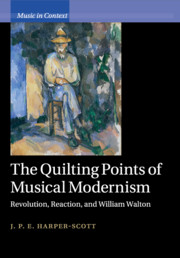Preface
Published online by Cambridge University Press: 05 September 2012
Summary
Aunt Edna does not appreciate Kafka – ‘so obscure, my dear, and why always look on the dark side of things?’ – she is upset by Picasso – ‘those dreadful reds, my dear, and why three noses?’ – and she is against Walton – ‘such appalling discords, my dear, and no melody at all’.
I have been very wrong. It has been obvious to me for some time that something is missing from our definitions of musical modernism. The term is both a contested aesthetic category and a powerful political statement. Modernist music was condemned as degenerate by the Nazis and forcibly replaced by socialist realism under the Soviets. Sympathetic philosophers have interpreted it as a vital intellectual defence against totalitarianism, yet some American critics consider it elitist, undemocratic, and even unnatural. Despite its evident importance, there is little agreement among this range of critics as to what the canon of modernist music actually comprises, what its aims are, or even how it differs from its supposed predecessor, romanticism. In my first book, Edward Elgar, Modernist, I sought to complicate the musicological picture of modernism by expanding the technical definition of what modernist musical gestures could be. This seemed to me necessary in the face of music which, despite being relatively unchallenging to listen to, conspicuously explored the great themes of modernism – alienation, fragmentation, uncertainty – and partook, in some way I wanted to determine, of its intellectual if not its aesthetic aims.
- Type
- Chapter
- Information
- The Quilting Points of Musical ModernismRevolution, Reaction, and William Walton, pp. xi - xxiiPublisher: Cambridge University PressPrint publication year: 2012



